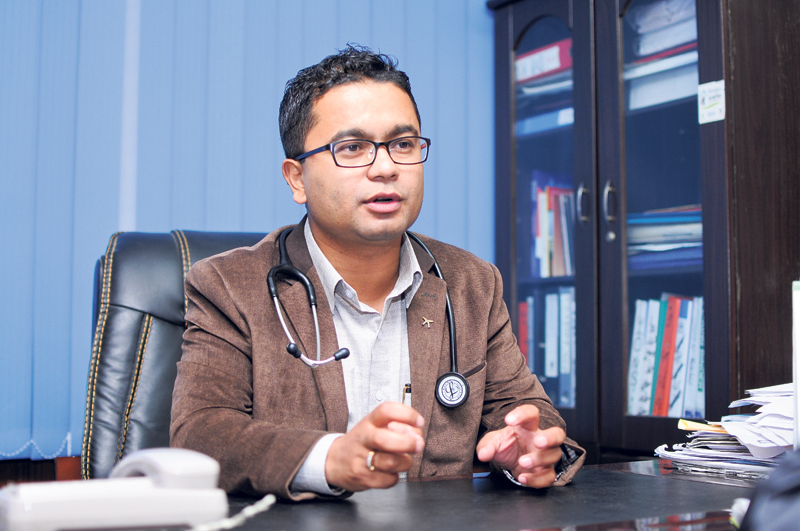
OR
Health Corner

The changing weather already has most of us sniffling, coughing, and walking around with tissues, and it is only going to get worse as November gives way to colder months. The Week talked to Dr Pukar Thapa, general physician at Alka Hospital, Jawalakhel to learn more about the diseases that could potentially affect you during winter months and how to try and steer clear of them.
Vitamin D deficiency
Vitamin D deficiency has been on a rise and has been seen in huge numbers even through the summer season so there are high chances that the numbers will continue to climb during winter. It is true that if we stay out in the sun for a certain period of time, the skin synthesizes and produces Vitamin D on its own. However, according to Dr Thapa, even a Rickshaw puller who spends his whole day out in the sun has recently been diagnosed with a Vitamin D deficiency.
If you have generalized body aches and pains and if you have been feeling lethargic without any seeable factor, Dr Thapa recommends getting your blood tested for Vitamin D levels. 99% of the time, the causal factor will be Vitamin D deficiency.
Pneumonia
Pneumonia is caused by either a bacterial or a viral infection when you breathe the germs into your lungs and you’re more likely to get it if you have caught the flu or a cold. These illnesses reduce your lung’s capacity to fight infections leaving you vulnerable. If you have chronic diseases like asthma, diabetes, heart diseases, cancer or HIV, you are more susceptible to the disease.
If you have a persistent cold or fever that refuses to go away and you cough mucus that is rusty or green or tinged with blood, you most likely have pneumonia. When the fever is laced with other symptoms, you should immediately go see a doctor. Pneumonia is most likely to affect the extreme of ages, the children and the elderly.
Dr Thapa recommends not taking infants and elderly (or any other immune compromised people) to hospitals or any other places that may have sick people. Dress warmly according to the weather and try to stay warm all the times to try and avoid catching pneumonia. If you accidentally happen to spill water on your clothes or get it wet in any other way, change immediately and make sure you stay dry.
Bronchitis
The mucus membrane is inflamed making the tiny airways into the lungs narrow or shuts it off, resulting in a coughing spell that might be accompanied by phlegm and breathlessness. Acute bronchitis is caused by viruses, typically those that also cause colds and flu, and by bacterial infection and exposure to substances that irritate the lungs, such as tobacco smoke, dust, fumes, vapors and air pollution. Chronic bronchitis is caused by repeated irritation and damage of the lung and the airway tissue. While smoking is the most common causes of chronic bronchitis, other causes include long-term exposure to air pollution, dust and fumes from the environment, as well as repeated episodes of acute bronchitis.
Although there aren’t any preventive measures per say for bronchitis, you can take some steps to try to keep them at bay. Dr Thapa suggests that you quit smoking if you can, and if you can’t at least try and limit it. It is really hard to stay away from all the dust in the city at the moment but you can try to limit exposure by wearing masks. If you travel in a bike, take a shower every night and regardless of how you travel, take a steam every night to clear your airways of all the dust and help your lungs win the battle with the foreign bodies in your system.
Chilblains
Chilblains are the painful inflammation of small blood vessels in your skin that occur in response to repeated exposure to cold but not freezing air. It can cause itching, red patches, swelling and blistering on your hands and feet. It usually clears up within one to three weeks, especially if the weather gets warmer but most people have recurrences seasonally for years.
There aren’t any medical treatments available for chilblains, however you can avoid them by protecting yourself from the cold and using lotions to ease the symptoms if you get it. Dr Thapa recommends applying oil in front of the heater at nights and avoiding cold water during the winters. For those who have chores to do, wash dishes and clothes with warm water, or wear latex gloves to protect yourself from cold water. Also, wear socks all the time and fuzzy indoor slippers to keep your feet warm.
Chilblains don’t usually result in permanent injury but the condition can lead to infection, which may cause severe damage if left untreated. The best approach to chilblains care is to simply avoid developing them by limiting your exposure to cold, dressing warmly, and covering exposed skin.
Viral fever
Viral fever refers to a wide range of viral infections, usually characterized by an increase in normal body temperature. It is quite common in children and old people due to lowered immunity. People suffering from these infections also experience body aches, skin rashes and headache.
Three out of five patients who visit the hospital have viral fever as it spreads very easily. When an infected person coughs, sneezes, yawns or even talks, the bacteria and viruses from their body transfers to you if you are close enough, through your nose or mouth and infect you. Once infected it takes anywhere between 16 hours to 48 hours to turn into a full blown infection.
There is no treatment for viral fever. There are only virus supportive treatments for some of the viruses that may have caused the fever. The fever usually goes down on its own when it has run its course but can sometimes get severe, and hospitalization might be needed.
Try to avoid public transportations and other crowded areas as a way to prevent contracting the fever. If you do, make sure to wash your hands regularly and do not touch your mouth and nose without having washed your hands first.
You May Like This

SC to charge ‘middlemen’ with contempt of court
KATHMANDU, Jan 21: Admitting that ‘middlemen’ were unduly influencing the judiciary, Chief Justice Cholendra SJB Rana on Sunday said he... Read More...

Around 1,000 under police control on charge of attempting to spoil polls
KATHMANDU, Dec 6:The Nepal Police have taken around one thousand people under control on the accusation of attempting to spoil... Read More...

New bride forced out of home on charge of witchcraft
KATHMANDU, March 9: A newly married woman here was forced out of her home on the charge of practising witchcraft. Read More...





Just In
- Nepalgunj ICP handed over to Nepal, to come into operation from May 8
- Nepal to gift two elephants to Qatar during Emir's state visit
- NUP Chair Shrestha: Resham Chaudhary, convicted in Tikapur murder case, ineligible for party membership
- Dr Ram Kantha Makaju Shrestha: A visionary leader transforming healthcare in Nepal
- Let us present practical projects, not 'wish list': PM Dahal
- President Paudel requests Emir of Qatar to initiate release of Bipin Joshi
- Emir of Qatar and President Paudel hold discussions at Sheetal Niwas
- Devi Khadka: The champion of sexual violence victims



_20240423174443.jpg)










Leave A Comment